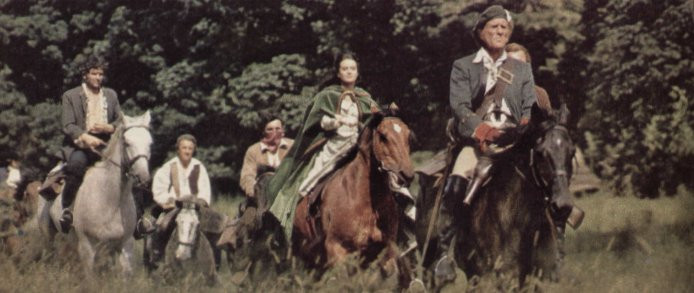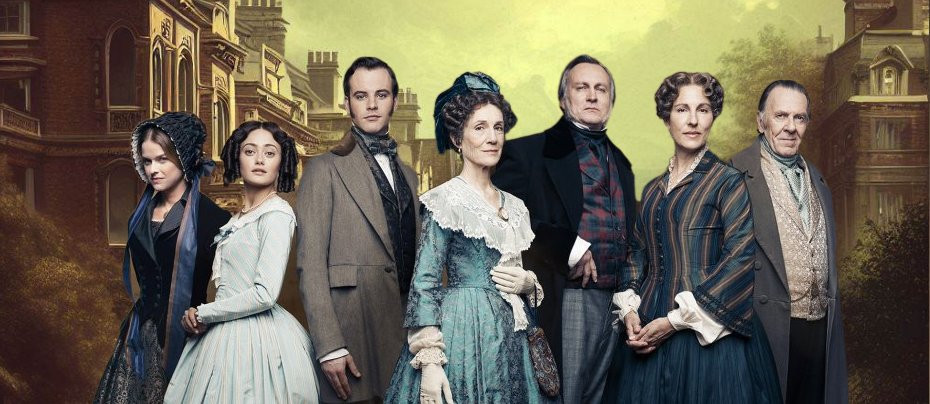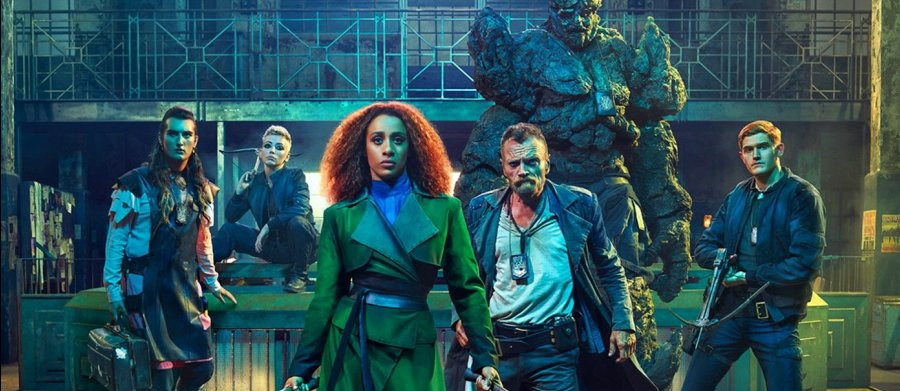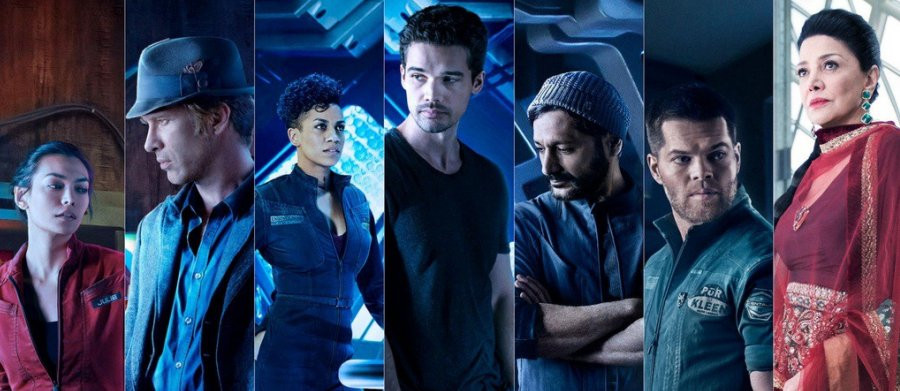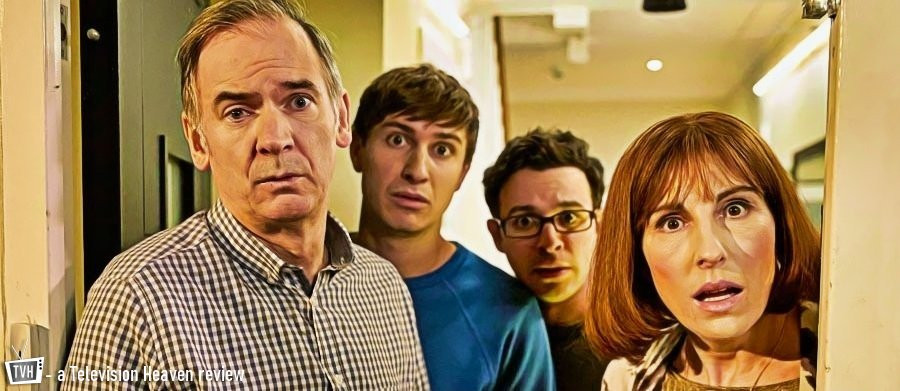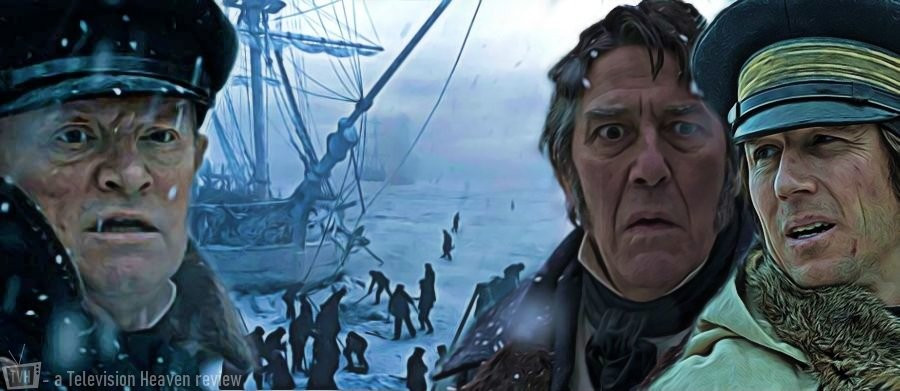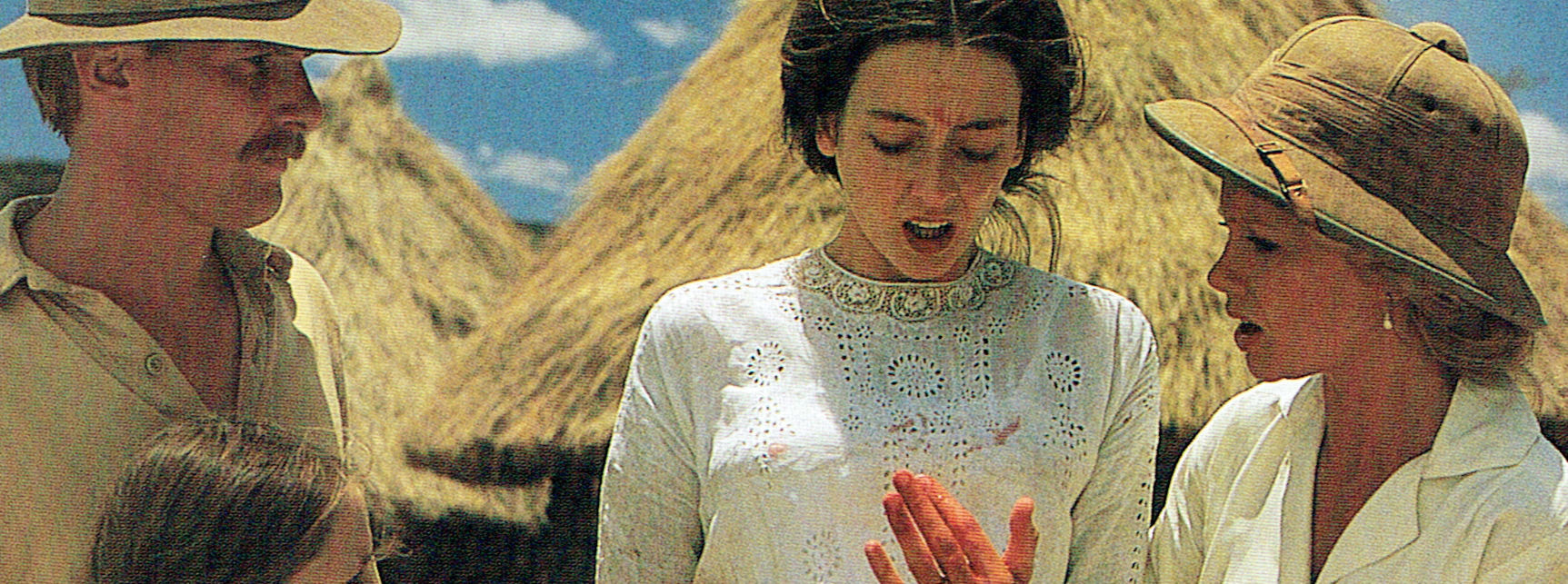
Chernobyl
2019 - Uk UsaAlthough it is intrusive, television is not an immersive experience like cinema, theatre, or opera. Yet there are some very rare occasions when a television drama transcends its medium. One ceases to look at a screen passively from an emotionally safe distance. One is moved, in every sense, to a completely different time and place and culture. This is what Chernobyl achieves for just over five hours.
The plot is simple. It is well known, so spoiler warnings are superfluous. It is, of course, a true story.
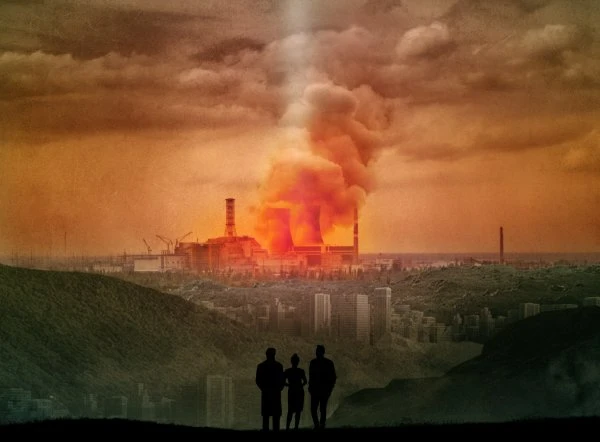
A reactor explodes during a test at a Soviet nuclear power station. At first no one can believe that it has happened: Soviet made reactors simply do not explode. When it can no longer be denied that one has, then everyone seeks to cover themselves and evade responsibility. At the same time, there is the minor matter of a fire and a leak threatening to contaminate much of Europe with potentially lethal levels of radiation.
The first three episodes deal with the immediate aftermath of the explosion, including the race to put out the fire, contain the leak, and prevent a literal meltdown that would make the most economically significant parts of the Soviet Union uninhabitable for centuries. This is not helped by the unwillingness of the regime to show weakness by admitting to its own people and to outside world, including the hostile West, that there is a serious problem. That would be admitting the failure of their whole system. So almost everyone goes into denial - note the word "almost." There lies the human drama.

The fourth episode deals with the heart-breaking process of "cleaning up," a euphemism that encompasses the use of young conscripts as "biorobots" to clear lumps of radioactive material by shovel and coping with the consequences of the hurried evacuation order not extending to pets. It is horrible viewing for any animal lover, but it brings home the full cost of human failure.
The fifth and final episode uses the trial of the power station managers as a device to go back in time to show the events leading up to the explosion. What follows is simply one of the most powerful hours of drama ever presented in any medium. One has to see what has gone before in order to make sense of it and get the full emotional impact, but if Chernobyl as a whole is worthy of 'Television Heaven,' then its last episode should be at the foot of the Throne.
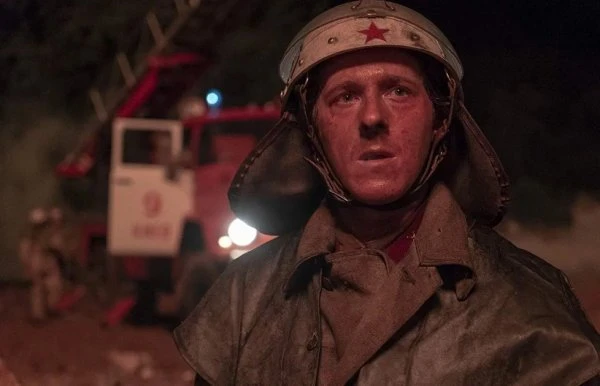
This is one of those programmes everyone, absolutely everyone, should see at least once. It brings a lot of important lessons that may seem abstract right down to the human level and it might even change the lives of those who have never learned those lessons in the first place. We see the very best and the very worst of humanity, sometimes within the same characters.

The "miniseries" is the perfect case study in the immorality and inefficiency of highly centralised political systems in general and of Soviet Socialism in particular. Mikhail Gorbachev, who is portrayed ably but very unflatteringly by Swedish-Danish actor David Dencik in Chernobyl, is quoted as having written that the Chernobyl Disaster was the real cause of the collapse of the Soviet Union five years later. If that is an exaggeration - Chernobyl was not the cause but the effect of systemic failure - there is still a lot of truth in it. As the bureaucrats had feared, the weakness that led to the Disaster and the inadequacy of its response was exposed to the world. Everyone in the Soviet Union knew that it was just one extreme example of a general problem they could see everywhere everyday, but after Chernobyl there could be no denying it anymore.
For that reason, Chernobyl is very controversial in Russia and Belarus, where there is, amazingly, still some nostalgia for the Soviet Union in some circles, including the very highest. The script has been criticised for taking a "Western" view of the Soviet Union.
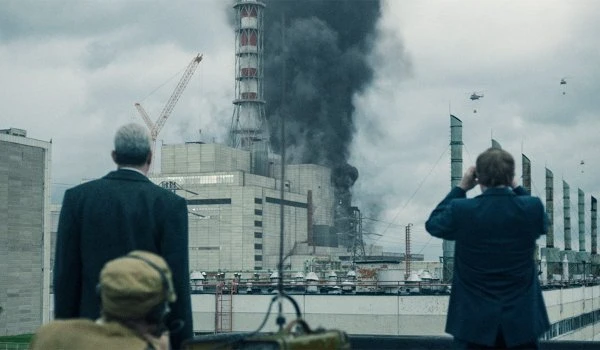
In one respect, this criticism is surprising: it is difficult to imagine a more sustained tribute to the courage and resilience of the people of Russia, the Ukraine, Belarus, and the other Soviet Republics. Although many were given little choice in the matter or were not made aware of the full risks or both, the casual self sacrifice of those who had a fairly good idea of the consequences of their actions to their own lives is incredible - duty staff entering lethally contaminated areas in a vain attempt to minimise the damage in the immediate aftermath of the explosion, a leading scientist flying to the disaster area in the certain knowledge that it will shorten his life, a high ranking General driving a truck in person to get an accurate reading of the radiation in the danger zone, truly these are the sons of the men who held Stalingrad.

Above all, how can anyone not be moved by a scene in which a Minister asks for volunteers for what everyone present knows is a suicide mission which may save millions of lives? There is none of the florid rhetoric generally associated with Marxism. All he says is that it must be done. Three men simply stand and state their names.
It is the most Russian thing ever
...except that the three men in question are Ukrainian. Chernobyl is actually in the Ukraine, near the border with Belarus. Most of those on whom the disaster had the greatest impact would not be Russian citizens today, but many of those in leadership positions were ethnic Russians. The clean up involved people drafted in from all the other Soviet Republics. An "animal control" team we meet in Chernobyl consists of a Georgian, an Armenian, and a Russian: if that sounds like a cliche, or the set up for a joke, such diversity was not uncommon.
So, while the script is indeed from a "Western" viewpoint, it can hardly be described as anti-Russian - quite the contrary - or even anti-Soviet to the extent that it is clearly sympathetic to the people of all the nations who found themselves subject to the Soviet system at that time. If it is anti-Soviet in the sense of attacking the Soviet system, that is not because it sets out to be a political polemic but rather because it just lets the facts speak for themselves.
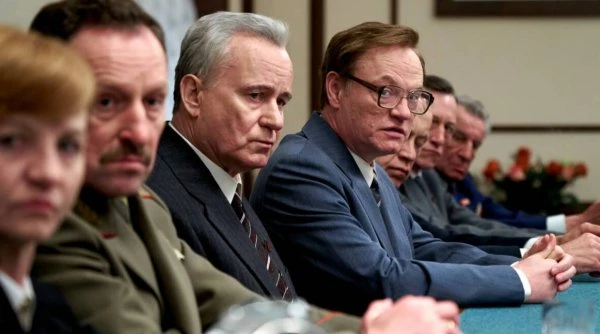
It is nevertheless legitimate to point out that no Westerner, including the Princeton-educated scriptwriter Craig Mazin, or indeed your reviewer, is really in a position to say what it was like to live under the Soviet system. There are always people who are keen to spot minor mistakes, but some supposed "mistakes" are deliberate and defensible choices as part of the dramatisation process. Given that truth is a major theme of the script, it is therefore ironic that it is not entirely accurate, nor is it meant to be. Aware of the irony, Mazin has, greatly to his credit, been very open about his dramatic choices, which is as refreshing as it is unusual in professional scriptwriting.

What can be said is that the script is particularly well researched and paints a credible picture consistent with what authoritative sources confirm. Some have complained that references to shooting and having people thrown out of helicopters would have been anachronistic in the Glasnost period of the 1980s, but watching them in their context they are not meant to be taken too literally or seriously as immediate threats. In any case, everyone making and hearing them would have been brought up at a time when the threats would have been real. In the Soviet Union everyone was conditioned from childhood to obey.
This social conformity is one of the great themes of Chernobyl. Although characters are sometimes threatened explicitly with losing their jobs, most of the time it would not have been necessary. They would have known that it would have taken no more than a single word from an irritated 'apparatchik' to end their careers completely and effectively wreck their whole lives. They would also have been aware than even in the Glasnost period the Soviet Union still had labour camps and political prisoners, and indeed the death penalty, even if it was not applied as promiscuously as it was when the principals were young.
The other great theme is how this social conformity leads to the suppression of facts that those in authority do not want to hear. We see this at all levels, from a shift manager shouting down his subordinates all the way up to meetings chaired by Gorbachev himself. It leads directly to the explosion and to all the mistakes that follow.
It is only fair to point out that it is not solely in the Soviet system that social conformity leads to suppression of inconvenient facts. It is a well documented psychological tendency we see in all political systems. It is not difficult to find examples in corporate cultures in "capitalist" states which have also led to disasters and cover ups. However, the extreme centralisation of power in the State in Soviet Socialism made them both more likely and more catastrophic in their consequences. Where a corporation is separate from the Government, there is at least the possibility of independent investigation and accountability. However, as Chernobyl makes clear, there is no hope of this where the State controls everything, so that criticism of anything is viewed as an attack on State policy.
So if Chernobyl is to be criticised on grounds of accuracy, it is not for exaggerating the suppression and oppression within the Soviet Union, but, quite the contrary, for exaggerating the frankness with which some spoke out so courageously. The whole point is that they were courageous because it was so difficult to speak out. For example, the main protagonist is given a stirring speech in the big court room scene. That is pure Hollywood. It did not happen and could not have happened in the Soviet Union at that time.

That fictional speech of a reluctant hero is nevertheless entirely justifiable in terms of dramatisation, not least because it provides a showcase for the talents of one of our very best actors, Jared Harris, as Valery Legasov, a real life character dramatically conflated to become the chief scientific adviser to the recovery operation. For some years Harris has been building up a curriculum vitae second to none, with outstanding performances in To the Ends of the Earth, Mad Men, The Expanse, and The Terror. For a long time he had to struggle with the label of being "Richard Harris' son," in spite of their acting styles being almost directly opposite. One can imagine Richard really chewing the scenery in that court room, but Jared is beautifully understated, a technocrat rather nervous at being thrust into such a public performance. It is the crowning moment of a wonderfully crafted role.
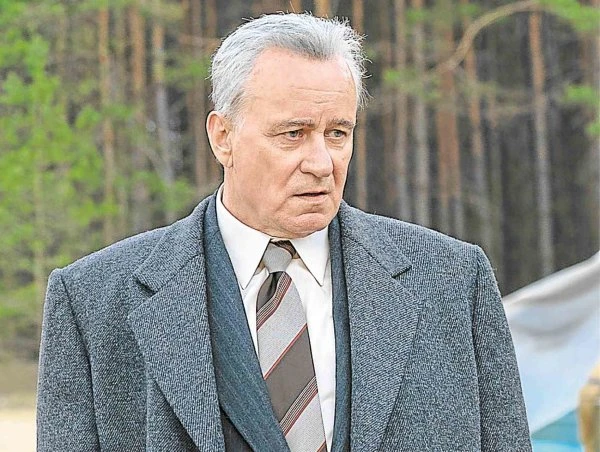
Indeed, Harris is so good that he manages to hold his own against another of the best actors in the world, Stellan Skarsgard, on top form. His Boris Shcherbina seems at first a typical blustering, bullying Soviet bureaucrat. The Deputy Chairman of the Council of Ministers appointed to lead the recovery, we assume he is going to be part of the problem, another obstacle for Legasov to overcome. It is therefore a surprise how much we end up liking him. The pivotal scene in which he realises the personal cost of his going to Chernobyl is a masterpiece. We cannot help viewing him differently after that. His humanity also comes through in a darkly comic scene involving a telephone - it takes doing to raise a smile in Chernobyl but Skarsgard does. Finally, towards the end, there is one of those scenes that prompts young people to choose acting as a career, just Skarsgard and Harris sitting on a bench, talking honestly, perhaps for the first time, in a culture where honesty is no virtue.
Like the scene with the volunteers, it is one of those moments where a manly clearing of the throat is permissible.
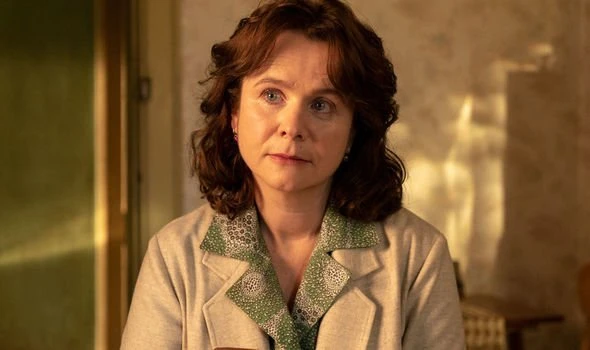
Film buffs will also enjoy the reunion of Skarsgard with his Breaking the Waves co-star Emily Watson. She plays a composite character representing a number of scientists who shared Legasov's concerns. Although it is not surprising, given the time and place, that most were male, the producers can hardly be blamed, given a choice, for casting a beautiful woman, and Watson, one of the most intelligent actresses in the business, is convincing in spite of the character having less grounding in fact than the other two principals. She has a wonderful luminous quality that brings light to some very bleak scenes in a Moscow hospital, as if offering hope to the dying that their testimony and her science will ensure that their deaths will not be for nothing.
This highly prestigious trio is backed by an extremely strong supporting cast of mainly British actors.
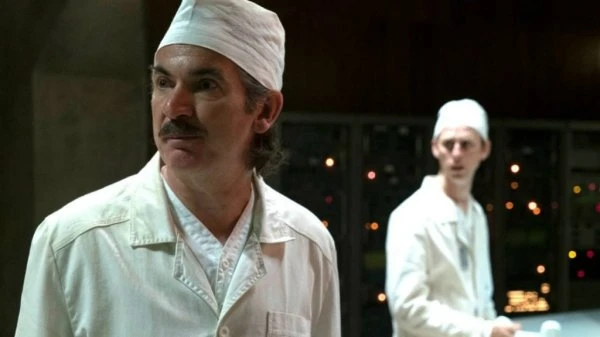
By far the most memorable is the late Paul Ritter as the arrogant shift manager whose actions are the immediate trigger for the disaster. He really ought to have been up there with Harris, Skarsgard, and Watson when it came to the Awards. He manages to evoke some sympathy even for an extremely unsympathetic character, and the point is well made that he is also a victim of the system: like most bullies, he bullies because he is bullied, and he is ignorant of what he should know because he has been kept that way deliberately.
Sam Troughton and Robert Emms are poignant as a pair of frightened mid rank employees on the night shift who seem at first to be most concerned about making it clear that nothing is their fault but who then take on a task of incredible heroism - again, simply because it must be done.
At the other end of the sympathy scale, playwright Alan Williams, with the assistance of a perfectly cast pair of glasses, is affably terrifying as the Deputy Chairman of the KGB who seems to know everything and is determined that everyone else knows as little as possible. He sometimes exudes a sinister benevolence, usually relying on the pervasiveness of fear rather than overt threats, and is all the more frightening for that.
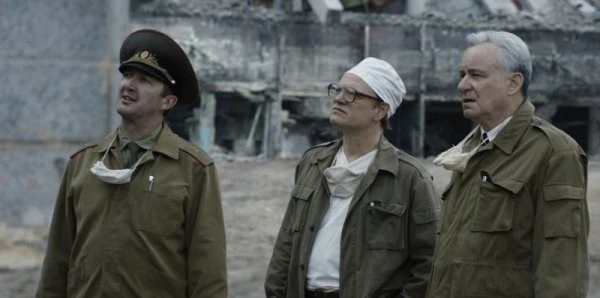
Mark Lewis Jones and Ralph Ineson convince as tough but sympathetic Russian Generals. Ineson's character, Major General Nikolai Tarakanov, is, amazingly, still with us at the time of writing - and fighting an uncaring bureaucracy for funding of the medical treatment of health problems that are a direct consequence of his heroic work in clearing up after the Disaster. He is said to be pleased by the way Ineson portrayed him and, subject to some minor points of accuracy, by the production in general.

Alex Ferns excels as a surly but courageous and hardworking miner. An actor of great presence, he has been criminally underused in recent years: perhaps he was just too memorable as the ghastly Trevor, who bullied poor Little Mo in EastEnders. Apparently he was so convincing there that he received death threats. Anyway, it is good to see him here - even if we see a little too much of him: no, the miners did not work completely nude in the extreme heat under the power station. James Cosmo, Ferns' co-star in the unfairly neglected Man Dancin, has a very brief cameo as another miner but evidently did not want to hang around for the Full Monty scene.
Cosmo is one of several Game of Thrones alumni who make guest appearances in Chernobyl - possibly because both shows were made by HBO who had them on speed dial. There was some comment at the time that Chernobyl was HBO redeeming itself after the disappointing final season of Game of Thrones. Irish actor Michael McElhatton, Roose Bolton himself, is appropriately cast as a splendidly uniformed Public Prosecutor, who is more of a Master of Ceremonies than an advocate in the trial scene.
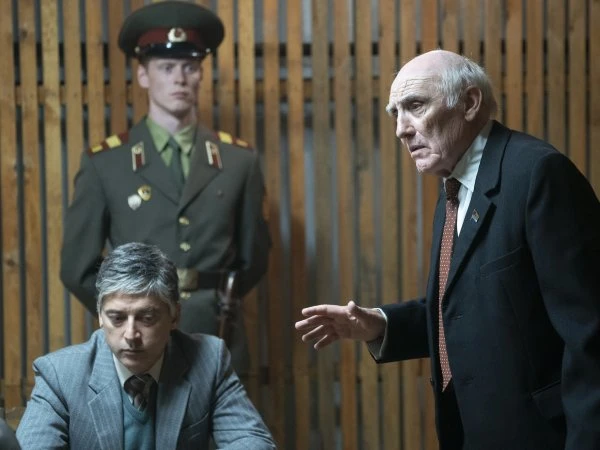
Even better is Donald Sumpter, the benevolent Maester Luwin in Game of Thrones, as an old Bolshevik who gives a very effective speech about how it is important to trust and obey the State. This is one of the most telling moments in the whole production, because it shows how it was not the threats of shooting but the social conditioning that was the most powerful force underpinning that fatal conformity. Many people actually believed that stuff and those who had doubts found it wiser to keep quiet about them in the face of such passion. The last we see of his character is when he is evacuated, and the look of pain in his face suggests not only sadness at leaving his home but a man confronting what is to him a complete loss of his faith.
Fares Fares is perfect as a hardened veteran of the Afghan War trying to hold on to a rough compassion in a horrible job. Peter Guinness is the usual Peter Guinness authority figure but also trying to retain a trace of humanity. Michael Socha is a foolishly naive young father. Ron Cook is an obstetrician out of his depth trying to treat what he assumes are mere chemical burns. Those are just some of the more familiar faces in a cast with no weak links. There is never any ostentatious "acting" that breaks the sense of reality.
The cast is backed by a production team outstanding in every department. The principal filming locations were a decommissioned nuclear power station and a residential suburb in Lithuania. The uniformity of the Soviet system meant that both had a strong resemblance to the sites where the actual events took place - which are still largely inaccessible, at least for the length of time required for production.
There is a discreet but definite visual theme to the "miniseries." At a distance, everything looks impressively modern and aesthetically pleasing. It is only when we see things close up, from the point of view of the people working and living in these places, that we see how cheap, soulless, and poorly maintained everything is. It is, after all, Russia that gave us the notion of fake 'Potemkin villages' but it sums up the ethos of totalitarian systems in general and the Soviet Union in particular, where outward appearance is more important than the human dimension.
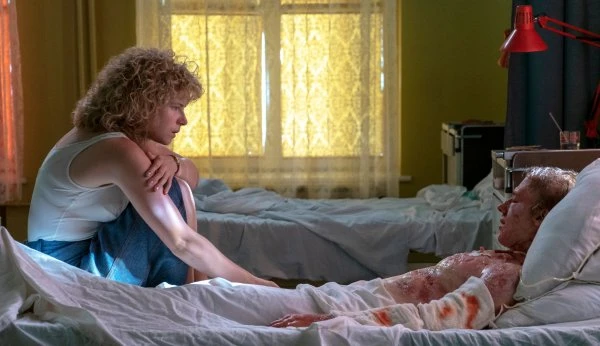
Of all the production departments, it is the makeup that has the biggest impact. It is handled cleverly, holding back on showing the worst of the burns suffered by some first responders in the early stages in order to magnify the full horror of what follows. Nothing is left to the imagination. We see men practically liquifying while they are still alive. It is a hard watch, but it also magnifies the courage of others, who exposed themselves to the risk, in some cases the near certainty, of the same thing happening to them.
Of course, none of this was generally known at the time. The official death toll is still only 31, despite it being well established that tens of thousands have had their lives shortened by cancers attributable to the Chernobyl Disaster. Even in the West there was a downplaying of the danger - whether though ignorance or to prevent panic or in order not to undermine public confidence in nuclear power is beyond the scope of this review. What can be said is that Chernobyl was the first time that many in the West, as well as the Soviet Bloc, were made aware of just how close the world came to millions of deaths rather than thousands.
It is also a deserved tribute to the previously nameless heroes - an overused word but in this case fully justified - who prevented that. If it is a gruelling experience, stick with it: believe it or not, there are actually a couple of happy surprises in the final notes before the end credits.
It is ultimately a strangely satisfying production, as well as a very impressive one and a hugely important one.
It is, like the events it portrays, if obviously to a lesser extent, positively historic in its own right.
Review: John Winterson Richards
John Winterson Richards is the author of the 'Xenophobe's Guide to the Welsh' and the 'Bluffer's Guide to Small Business,' both of which have been reprinted more than twenty times in English and translated into several other languages. He was editor of the latest Bluffer's Guide to Management and, as a freelance writer, has had over 500 commissioned articles published.
He is also the author of ‘How to Build Your Own Pyramid: A Practical Guide to Organisational Structures' and co-author of 'The Context of Christ: the History and Politics of Rome and Judea, 100 BC - 33 AD,' as well as the author of several novels under the name Charles Cromwell, all of which can be downloaded from Amazon. John has also written over 100 reviews for Television Heaven.
John's Website can be found here: John Winterson Richards
Seen this show? How do you rate it?
Seen this show? How do you rate it?
Published on July 6th, 2021. Written by John Winterson Richards for Television Heaven.


